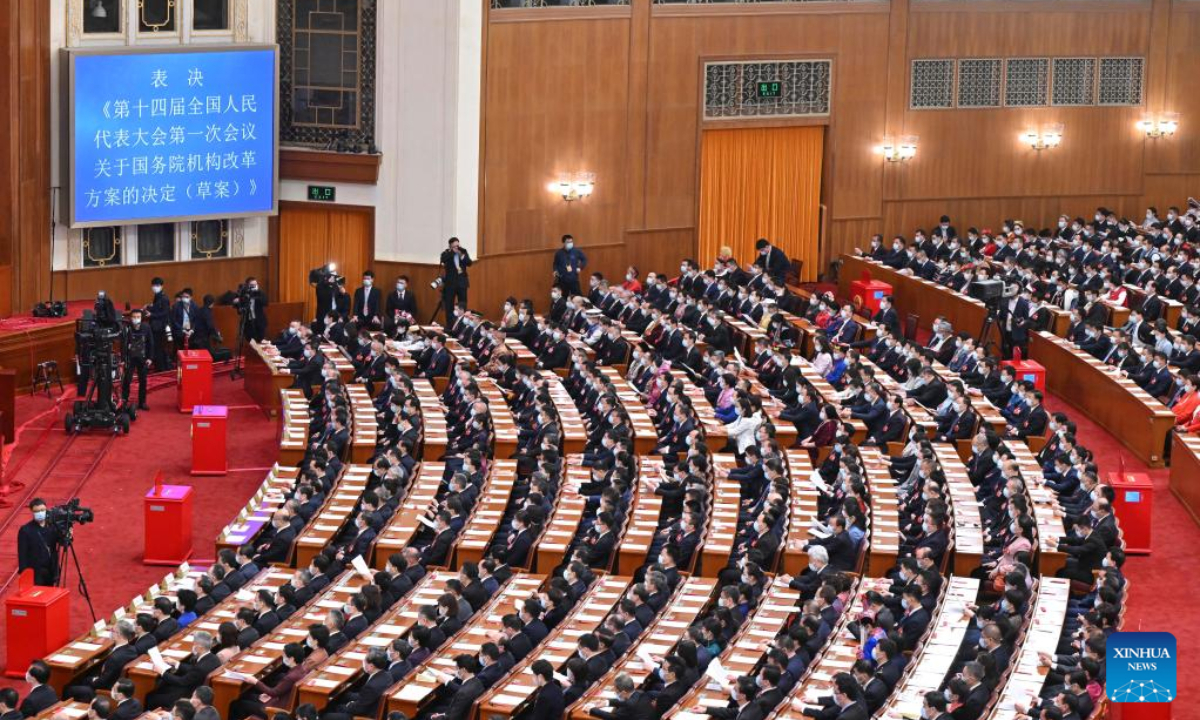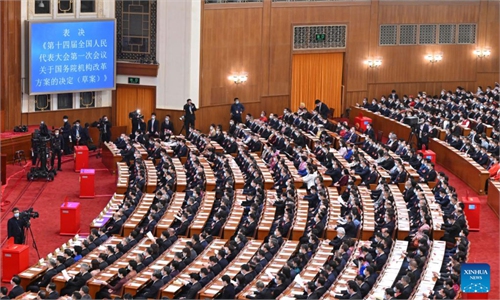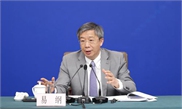China’s State Council institution reform plan approved
Important step in enhancing governance efficiency amid modernization drive

The third plenary meeting of the first session of the 14th National People's Congress (NPC) is held at the Great Hall of the People in Beijing, capital of China, March 10, 2023. Photo:Xinhua
China's national legislature on Friday approved a plan on reforming the institutions of the State Council, China's cabinet. With the institution reform, China would gradually establish a more unified, open market system with orderly competition, laying the institutional foundation for the country's ongoing push to build a unified national market, which is deemed key in accelerating the dual circulation development pattern, deputies and members said at the ongoing two sessions.
It also marks the ninth round of State Council institutions'reform since the reform and opening-up, observers said. They stressed that the reform represents an important step in enhancing the capacity and efficiency of governance amid China's modernization drive, rebutting what some Western media hyped "a tightened government grip" over the market.
After being approved by the National People's Congress (NPC), China's top legislature, the implementation will be swift and generally divided into two steps. First, specific reform plans will be worked out and submitted to the central government for approval, Chen Ming, associate research fellow, Institute of Political Science, Chinese Academy of Social Sciences, told the Global Times on Friday.
Second, the reform of local institutions will be carried out in accordance with the blueprint of the State Council institutions reform and the local conditions, Chen said.
China on Tuesday unveiled the sweeping reform plan for a slew of state institutions, and the plan was submitted the NPC for deliberation.
One of the focal points of the plan involves the restructuring of the Ministry of Science and Technology, setting up a new financial regulatory body and standardizing management of staff in financial departments, as well as setting up a national data bureau, which analysts said carries far-reaching ramification for China's social and economic development in the longer vision.
Cong Yi, a professor at the Tianjin University of Finance and Economics, told the Global Times on Friday that the core of the institution reform aligns with the internal requirement of building a unified national market. It also complements with the country's stepped-up efforts in this regard.
For example, in the financial arena, the overhaul aims at solving the issue of either fragmented or overlapped management. And will make the regulatory function more concentrated, responsibilities of the governing body more clearly identified and coordinated, and oversight more efficient, according to Cong.
Optimizing the financial supervision system, especially straightening out the relationship between central and local authorities in financial supervision, is conducive to breaking the institutional barriers to financial development, said Chen.
"This is a necessary precondition for the free flow of the elements between different financial market regimes, which is conducive for the sound development of China's financial system," Cong said.
In April 2022, China unveiled guidelines for accelerating the building of a unified national market, as part of a wide-ranging push for an effectively regulated, fairly competitive and fully open market across the country.
Chinese authorities have also been rolling out a raft of policies to remove local market protectionism, unifying standards and regulation across different regions and boost the smooth flow of products and resources on a larger scale.
The creation of the national data bureau is also a manifestation of the ongoing efforts.
According to the reform plan, the national data bureau is tasked to coordinate the integration, sharing, development and application of data resource. And it will be directly administered by the National Development and Reform Commission (NDRC), the country's top economic planner.
Yang Decai, a member of the 14th National Committee of the Chinese People's Political Consultative Conference and a professor at the Nanjing University, said in his proposal that "data is a new type of production element that plays a vital role in reducing market barriers, cutting transaction cost and elevating the factor allocation efficiency."
Yang flagged several problems in the domestic data element market, such as the absence of unified standard and mechanism design, as well as a lack of transparency and supply-demand information asymmetry that could easily lead to data monopoly by trading platforms.
And it is expected that the new bureau would provide an answer to the issues, setting in motion a new era in constructing a unified data element market.
With regard to optimizing the management of the scientific and technological innovation chain, it will promote the transformation of sci-tech achievements and the integration of sci-tech with economic and social development, thus help enhance the contribution of sci-tech to industries and smooth the industrial chains, according to Chen.
During the two sessions, other aspects of the institution reform plan such as rural revitalization, elderly care and intellectual property rights have also received welcoming feedbacks among deputies and members. The reform has also been applauded as adapting to the new development phase and new strategic opportunities amid complex global environment.
"The reform plan is targeted, involves a wider scope of areas…It will provide a strong institutional strengthen for the rejuvenation of the Chinese nation," said Yang Yuanyan, a member of the 14th National Committee of the Chinese People's Political Consultative Conference and deputy mayor of Laibin, South China's Guangxi Zhuang Autonomous Region, the China Business Journal reported.
China's reform to improve the functions of institutions is in accordance with the requirements of the modern national governance system, which is also necessary for the modernization of the governance capacity, observers noted.



